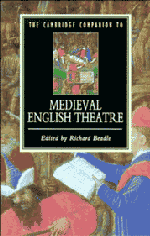Book contents
- Frontmatter
- 1 An introduction to medieval English theatre
- 2 The theatricality of medieval English plays
- 3 The York cycle
- 4 The Chester cycle
- 5 The Towneley cycle
- 6 The N-Town plays
- 7 The non-cycle plays and the East Anglian tradition
- 8 The Cornish medieval drama
- 9 Morality plays
- 10 Saints' plays
- 11 Modern productions of medieval English plays
- 12 A guide to criticism of medieval English theatre
- Select bibliography
- Continued Series List
- Index
6 - The N-Town plays
Published online by Cambridge University Press: 28 May 2006
- Frontmatter
- 1 An introduction to medieval English theatre
- 2 The theatricality of medieval English plays
- 3 The York cycle
- 4 The Chester cycle
- 5 The Towneley cycle
- 6 The N-Town plays
- 7 The non-cycle plays and the East Anglian tradition
- 8 The Cornish medieval drama
- 9 Morality plays
- 10 Saints' plays
- 11 Modern productions of medieval English plays
- 12 A guide to criticism of medieval English theatre
- Select bibliography
- Continued Series List
- Index
Summary
INTRODUCTION
'Corpus Christi plays', 'cycle plays': these are just two of the more familiar boxes in which modern critics have tried to contain the resisting diversity of much late medieval English drama. Indeed, such pigeon-holing has a long pedigree. Whoever wrote 'The plaie called Corpus Christi' on the first page of the play manuscript that concerns this chapter, British Library MS Cotton Vespasian D. viii, is the earliest known member of this critical family tree. He would hardly have foreseen that his sixteenth-century attempt to sum up the plays in front of him would have provided the title for one of the most successful studies of medieval drama in recent years, a study whose equally unforeseen consequence has been the encouragement of some homogenised ways of thinking about what a 'Corpus Christi cycle' might be (130). The fact is, however, that the plays of Cotton Vespasian D. viii are not tidily compliant, and resist the totalising project that the idea of a 'Corpus Christi cycle' has sometimes risked becoming. There is no evidence that these plays ever had anything to do with Corpus Christi, at least not in the most basic sense of their having been performed then; on the contrary, some were originally intended for performance on a Sunday. Nor has the Creation-to-Doom scope of the manuscript's content, which superficially invites comparison with the other three major mystery play collections of Chester, Wakefield and York, come about for comparable reasons. The former independence of some of its principal component parts has been suppressed: originally, these parts were never arranged according to any grand Creation-to-Doom design whatsoever. So in sum, it is juster to recognise the fascinating difference of this manuscript, and this sense of difference will, I hope, be an undertow to my introduction of it and of the plays of which it is no neutral transmitter.
- Type
- Chapter
- Information
- The Cambridge Companion to Medieval English Theatre , pp. 163 - 188Publisher: Cambridge University PressPrint publication year: 1994
- 2
- Cited by

